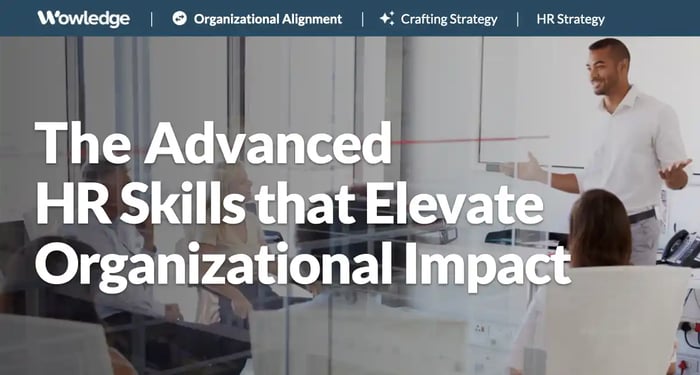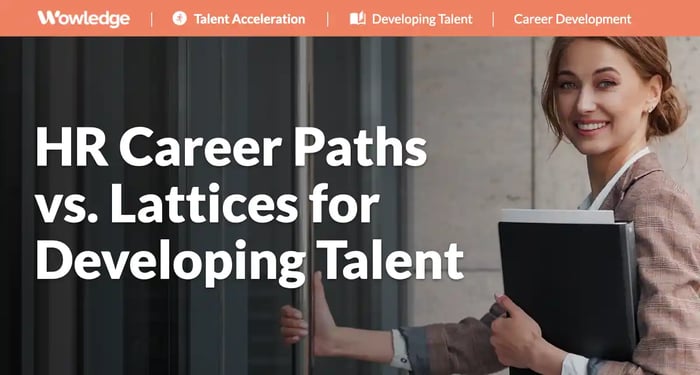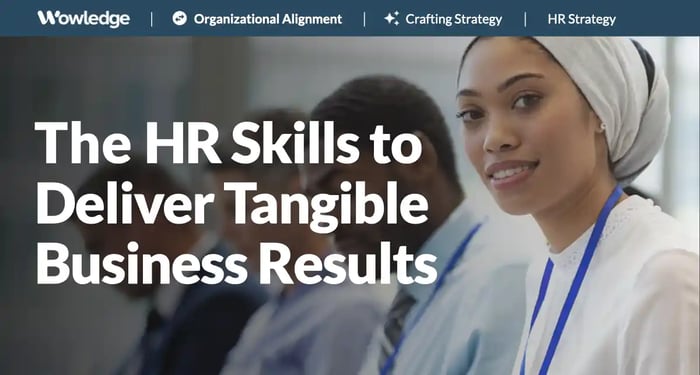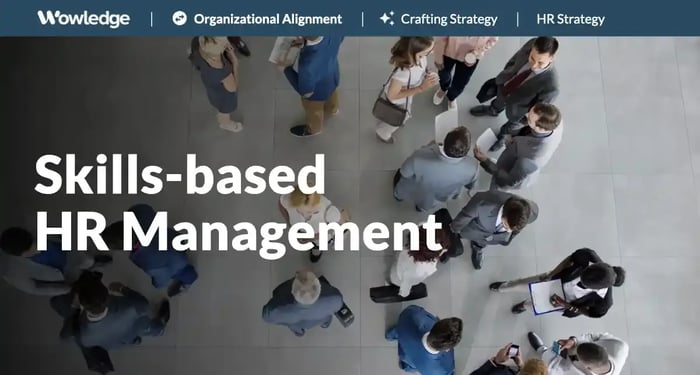Table of Contents
The role of HR teams is to generate talent and business impacts. That role represents a significant opportunity for HR leaders and necessitates a blend of business acumen, HR planning, and execution excellence. The key to success lies in having an organization with the right capabilities, which boils down to the collective skills of the HR team. This collective expertise and effective management foster a sense of unity and shared purpose among HR professionals. It is critical to long-term success that leaders and employees alike understand advanced HR skills that drive business outcomes.
We at Wowledge have presented insights and supporting data regarding the HR capabilities that have been demonstrated to impact business results. These insights underscore the crucial role of advanced HR skills in driving the business, making our work valued and impactful. At the same time, the building skills that drive such impacts is not just a collective responsibility but also a matter of individual growth and empowerment. Skills development is most commonly discussed at a singular employee level—what each team member needs to grow professionally, fill in expertise gaps, achieve their aspirations, and advance.
As a result, discussing individual HR career planning too often overshadows the more significant issue of HR organization capability gaps. Creating organization-level development of advanced HR skills should be a priority. Furthermore, it is crucial to understand that while much is written about strategic HR contributions by the HR Business Partner, the development and practice of strategic planning, action, and partnering must occur across HR functions (e.g., COEs and HR Shared Services) and mid-to-senior roles. A comprehensive view by HR leaders is required to assess those gaps and create consistent plans to close them.
Therefore, building organizational capability requires understanding and appreciating the advanced HR skills required for success. Moving beyond the hundreds of articles and opinions published yearly on making CHROs and HRBPs more strategically capable enables an understanding of what skills cut across all or segments of the HR population that can impact the business, regardless of HR function or role.
Defining and understanding skills
Any discussion of capability development needs to center on skills. Unlike competencies or traits, skills are observable, assessable, measurable, and, most importantly, can be learned and developed. Their value lies in that last element – they are subject to acquisition and can thus be added to a capability portfolio of individuals and organizations.
Traits are more permanent and are defined as genetically determined or inborn characteristics. They are foundational to each person’s personality and style and drive behavior. Examples include compassion, aggression, creativity, flexibility, and conscientiousness. Traits tend to define who an individual is and how they show up. On the other hand, skills define what an individual can accomplish versus what they rely upon to achieve that accomplishment.
Competencies are broader than (and can encompass) skills. They are defined as the “knowledge, behaviors, attitudes, and even skills that lead to the ability to do something successfully or efficiently.” Examples of competencies include decision-making, conflict resolution, dealing with ambiguity, learning agility, and managing change.
On the other hand, skills result from leveraging knowledge and the ability to achieve work goals and objectives. Major talent and technology providers have identified thousands of skills, with Mercer's database having over 4,000, for example.
Types of skills needed
Workers, across functions, roles, job levels, and organization types, exercise different groupings of skills to accomplish their tasks. Building an advanced HR skills model requires a categorization scheme, such as that proposed by Peter G. Northouse, which suggests the following three categories: “technical,” “human,” and “conceptual.”
Technical skills
These are skills related to a specific type of work or activity. They are essential for successfully conducting and completing tasks that produce or support the organization's outputs, such as strategic planning, product development, manufacturing, hiring staff, and managing expenses. In HR, examples include sourcing and screening job candidates, developing learning program content, managing the merit pay process, interpreting people analytics, and designing the succession planning process.
Human (or interpersonal) skills
These capabilities drive successful relationships and interactions with managers, peers, subordinates, and external stakeholders and partners. They involve working with others and include capabilities such as leadership, conflict management, relationship building, communication, active listening, collaboration, and interpreting other’s nonverbal actions and reactions. HR examples include emotional intelligence, building trust, influencing, managing change, and coaching and advising.
Conceptual skills
Skills in this category involve the ability to work with ideas and concepts. They are used to understand complex issues and circumstances and create action plans to address them. These enable leaders, project managers, and “ideators” to understand relationships between future events and their organization’s objectives. They power the communication of complex ideas into implications and plans that many can easily understand. Skills in this category enable leaders and subject matter experts to put strategies into context, explain a future vision and concepts to people, develop strategies, think creatively, and identify and solve problems. In HR, conceptual skills include critical thinking, decision-making, analytic reasoning, and strategic planning.

Critical HR skills to build, practice, and sustain
The HR-specific skills that drive results will vary by role and level. However, HR professionals can pursue many relevant skills to improve their ability to drive meaningful upgrades and impacts on talent and business outcomes. The skills listed and described below cover the primary ones that differentiate good from great HR capabilities but rely upon a fundamental case of “core skills” that can be built upon.
All HR roles have a common starting point, which involves mastering the technical elements and requirements for their function. For example, verbal and written communication is essential for success in any role. Administrative expertise – knowing the processes, systems, and policies associated with an HR function(s) is core to most roles. Legal and regulatory expertise is fundamental to creating and managing policies, practices, procedures, and strategies that comply with government obligations to avoid costly and time-consuming charges, investigations, litigation, and monetary or business penalties. The ability to research, act, and communicate with confidentiality and discretion are essential skills as they ensure that individually based issues and broader strategic plans and actions are handled with care until others outside the direct sphere of impact need to be aware.
The more advanced HR skills that leading-edge teams and individuals rely upon are those associated with high-impact HR practices. The value of each of these to an organization is determined by an individual's role, level, and function, but when aggregated, it can reflect the strengths or weaknesses of an HR team or function. These advanced skills tend to occur in more tenured and mid-to–senior-level professionals and thus should be part of a formal development program.
1. Critical thinking
This is the skill people use to understand an issue and form a judgment or make a decision based on that understanding. Many take this process for granted, as decision-making can happen instantly. What is different is that in HR and business contexts, it involves a thoughtful and disciplined process of data collection and analysis of the available facts, evidence, and opinions that lead to an objectively formed judgment that leads to a well-informed conclusion, direction, or decision.
Advanced HR professionals and teams employ methods that cluster around formal HR performance consulting, organization development practices, and business process improvement practices such as Lean, Six Sigma, TQM, Kaizen, PDCA, and others. Associated with evidence-based HR (EBHR), this helps create a culture of objective problem identification and resolution, more robust alignment of HR solutions with business objectives, and higher credibility of the HR team as it deploys disciplined processes for problem resolution.
2. Influencing and negotiating
The advanced HR skills related to understanding an internal client’s needs relative to their business objectives and using more objectively based insights and expertise to promote solutions, propose constructive changes, and gain stakeholder support are critical for CHROs, HRBPs, and COE leaders. This is the core of the business partnership role and central to the HR value proposition. It requires trust, tact, effective communication, and business knowledge. It leverages HR expertise, change management, emotional intelligence, confidence, and faith in shared conclusions and proposals. Understanding each stakeholder's viewpoints, biases, and preferences requires active listening and consistent messaging about a solution set's benefits and business value.
3. Coaching and advising
The ability to effectively guide leaders, managers, and employees is elemental to strategic HR. Acting as a sounding board, demonstrating empathy and understanding of the individual's position and situation, offering multiple action options, providing constructive feedback, and helping the individuals find their own answers are core to successful coaching. Understanding when coaching is (or is not) more appropriate than advising, consulting, or mentoring is a critical but nuanced advanced HR skill that often comes with practice and tenure. Related to influencing and negotiating, skills in building trust, exercising tact, being transparent and courageous with feedback and guidance, and understanding the stakeholder’s unique position, circumstances, and preferences for action are required.
4. Culture management
Understanding how to create, enhance, and sustain a culture aligned with the business mission and objectives is crucial to the HR agenda. Knowing how to define it for each business, assess it, and integrate practices, policies, programs, policies, and platforms to support it is elemental to HR success. Skills related to this include communication, leadership behaviors, emotional intelligence, ethics, and change management. Expertise in employee listening practices and platforms, creating vision, mission, and values statements, embedding values in employee performance and succession standards, goal-setting processes that support the culture and aspirations, establishing and supporting well-being practices and programs, and coaching managers and leaders are all skills that support these. Integrating fairness and equity in employee treatment and resource access across talent practices is essential.
5. Technology transformation
Understanding HR and business technologies and how to design and upgrade them for improved user experience are critical skills as digital transformations become increasingly common. The growing adoption of AI and machine learning-based technologies is changing workflows, job duties, and related skill requirements and adding pressure on employees to adapt accordingly. Technical expertise or knowledge, employee privacy protections, design thinking, change management, collaboration, and team leadership are helpful for today’s HR professionals across business partner, COE, and HR Shared Services roles.
6. Analytics and data-driven decision-making
The ability to understand basic statistics and analyses, interpret reports, perform drill-downs, assess and use analyses for decision-making, and communicate findings to non-HR audiences are mandatory skills. Further awareness of the data that is available in various HR and business systems (e.g., enterprise resource planning (ERP), vendor management (VMS), and financial planning and analysis (FP&A), are advanced HR skills that enable the requesting or conducting of integrated HR and business analyses that can illuminate the impact of HR practices on business results. Leading practice supports using evidence-based HR (EBHR) as a methodology for better leveraging available data, observations, and facts from internal and external sources.
7. Change management
The preponderance of technological, social, and even political changes emphasizes the need for solid and disciplined approaches to gain acceptance, alignment, and adoption of new enterprise processes, programs, practices, and platforms. Change management skills have never been more crucial for any HR team member involved in introducing (or supporting) new work methods, talent practices, technologies, and upskilling requirements. The challenges include alterations to work schedules and location requirements, adoption of AI-related technologies, expanding and condensing DE&I programs and teams, pressure on corporate social advocacy, and increasing talent shortages and resignation rates. Employees and leaders need structured and well-considered ideas and guidance to understand and manage these in ways consistent with the company's purpose, mission, and values.
8. Collaboration
All HR professionals must have the skills to work with and through others. Business impact comes through joint efforts with HR peers, business leaders, and their teams. Skills related to group facilitation, improving team (and interpersonal) effectiveness, networking across the enterprise, and project participation and management enable the few (HR) to achieve more through and with (the many) others. Robust organizational issue resolutions come when HRBPs share business challenges with COEs, CHROs work with C-Suite peers, HR Shared Services teams collaborate with IT, and L&D professionals coordinate efforts with underperforming teams. Advanced HR skills include team formation, conflict management, coaching and consulting, project management, root cause analysis, and team solution identification, all associated with great collaboration.
9. Risk management
Awareness of external forces that can impact operations and act as barriers to goal achievement is a newer but no less critical skill set for HR professionals. Issues related to environmental, regulatory, public health, and competitive risks may not be widely understood or acknowledged by leadership at multiple levels of an organization. The abilities to conduct an objective data- and fact-based evaluation, develop a meaningful and trustworthy analysis and business case, create a compelling and understandable narrative, and communicate the outputs convincingly have emerged as advanced HR skills. Emotional intelligence plays into this, as deepening political, social, and geographical biases have found their way from the public to corporate spheres, and many of the issues (such as climate change and public health) have become divisive issues that require sensitive handling.

How HR professionals can develop these skills
Skills need to be acquired, practiced, and updated as advances emerge. The notion of a certification, where annual CEUs (continuing education units) are required to retain the acknowledgment of merit, is consistent with this recommended approach. Certifications are excellent options as they may include learning hours and proctored or monitored testing demonstrating acquisition and the ability to apply the learning to simulated or real-life circumstances. Leading practices in talent development remain the standard, including a continuous learning approach and mindset. Meaningful learning and development options for advanced HR skills include:
- Formal learning — eLearning, publicly eLearning, publicly-available online courses (universities, Udemy, Coursera), professional association courses (SHRM, HRCI, ATD, WorldatWork, AMA, NHRA), university-based HR programs, or commercial providers (LinkedIn Learning, Oxford Home Study Centre). Certification programs are available in HR, Compensation, Benefits, Analytics, AI applications, Talent Development and L&D, Talent Acquisition, Talent Management, and HRIS.
- Self-directed learning — books, articles, or following influencers on LinkedIn, Harvard Business Review, MIT Sloan Review, Gallup, Mercer, ATD, SHRM, and WorldatWork.
- Job experience — the value of job rotation, special projects or assignments, added responsibilities, and exploring external opportunities to gain valued experiences bring career development strategies into focus as skill development options. Gaining on-the-job experience is the ideal way to learn (especially when paired with a formal learning program to gain fundamentals), practice, and apply what is learned.
- Special projects — assignments as team members or leaders often provide opportunities to learn and practice structured methodologies for defining and evaluating a problem or challenge and then collaboratively designing, developing, and implementing a solution. These are excellent vehicles for skill acquisition and growth, as they also enable the broadening of team members’ networks for future job-related collaboration and problem-solving.
- Mentoring and partnering — approaching (or being matched with) an expert in the field or HR function that uses the desired skills is an excellent way to supplement formal or informal education and development activities. Asking those engaged in the aspired-to-work activities for time to discuss what skills are required and how they leverage those in their daily work is a great starting point, especially if it leads to ongoing meetings. More advanced steps include requesting invitations to sit in on planning and design sessions or meetings and asking for a temporary (or part-time) assignment to partner on a team project. A key element of making mentoring or partnering work is being prepared with fundamental insights into the function and its standard methodologies. This might entail taking an online course(s), pre-reading or reviewing books, articles, and how-to guides. Before each session, prepare and bring focused questions about the work process, barriers faced or anticipated (and why), solutions or methodologies to be deployed, and options for the selected direction or method to be used.
A final note on sustaining newly acquired skills
Learning new material or getting certified is not enough – newly absorbed knowledge must be put into practice to be solidified in one’s memory. Think of the golf swing, which can be taught and practiced independently. If it is not applied in an actual round of golf with frequency, the skills and muscle memory fade. As there are many types of golf shots (drives, approaches, chips, and putts) and nuances about each, practicing each under various circumstances regularly better ingrains them.
The same holds for HR skills. Practicing them in different circumstances enables imprinting the experiences and lessons learned into long-term memory. The key is to look for application opportunities without finding a problem for which the tool does not fit. Opportunities often arise in concert with or anticipate an emerging business or talent challenge. An upcoming RIF might be an opportunity to learn about and volunteer to support the change management process for remaining employees and leaders. Heavy growth often results in staff and associated leadership and management team expansions that can offer opportunities to practice and learn coaching skills.
Relevant Practices & Tools
Advanced Learning and Development Practices to Accelerate Skill and Capability Growth. >
These practices focus on developing, staffing, and managing a learning and development function that is highly responsive to business needs and leverages both technologies... more »
Employing Advanced Stakeholder Engagement Techniques to Reinforce the Criticality of the Targeted Change. >
When done effectively, stakeholder engagement creates trust with the initiative team, generates honest dialogue to build support for the changes, and reduces the potential for conflict... more »
Expanding Career Development Options to Include Hands-on and Group Learning Opportunities. >
Beyond formal learning (certifications, courses, degree programs) and standard informal methods (eLearning, mentoring), leading organizations use increasingly novel and effective methods... more »
Building a Culture of Coaching and Mentoring that Creates a Continuous Learning and Improvement Environment. >
Establishing and managing a sustainable culture of coaching and mentoring is an integrated effort that builds an environment where continuous development and growth take center stage... more »
The Training Needs Assessment Tool: Document New Skills or Knowledge Required for Stakeholder Groups Impacted by Change. >
This tool helps identify training interventions to help overall employee performance and ensure those affected by the change are adequately prepared... more »
About Wowledge
Wowledge is the expert-driven platform for lean teams building strategic HR programs. Members enjoy access to up-to-date best practices, step-by-step guides, tools, templates, and insights to accelerate the design and implementation of all key HR programs and processes.
Since each organization has unique characteristics, needs, and aspirations, Wowledge's practices are developed utilizing an exclusive stage-based approach – from Core to Advanced to Emerging – that reflects distinct levels of sophistication to meet our members where they are.
Build strategic HR programs with refreshingly easy-to-follow best practices.
Get started for FREE! Learn more.










